

Whether you’re looking for a better way to feed your busy family or you’ve experimented with freezer meal prep before and want to step up your freezer game, you’ve come to the right place!
Freezer meal prep has been a real game-changer for us.
In 2017, we were looking for ways to freeze our soups and sauces in convenient portions. I struggled with all the conventional ways of freezing food - endless containers, bags that can rip, or jars that can shatter. Jake always knew there had to be a better way to freeze our food. Over the past few years, we’ve learned A LOT about the ins and outs of freezing food and it’s become a real passion of ours along the way. (So much so that we created our entire business around making freezer meal prep more convenient!)
I’m excited to finally sit down and share all our best tips and tricks with you here.

First off, I need to be honest with you...
This article is a BIG one! I wasn’t kidding when I called it the “Ultimate Guide to Freezer Meal Prep”! I dive deep into everything from:
- Freezer meal prep basics
- Tools you’ll need
- Tried-and-true tips
If you’re looking for specific information, feel free to jump ahead to the section you need. However, if you’re brand new to the world of freezing food, we recommend you strap in and read the entire article from top to bottom.
By the end of this article, you’ll have all the knowledge you need to become a freezer meal prep pro and start stocking your freezer with tons of delicious freezer meals for you and your family.
Are you ready? Let’s jump in!
Part 01
The Basics of Freezer Meal Prep
You might be wondering, what is freezer meal prep? What makes it different from other types of meal prep and what’s all the hype about? Think of this section like ‘Freezer Meal Prep 101’. We’re going to kick things off with a crash course on freezer meal prep basics to give you all the background info you need.


Freezer Meal Prep vs. Other Meal Prep
Whereas freezer meal prep involves storing prepared food in the freezer, traditional meal prep involves storing prepared food in the refrigerator. The benefit of freezer meal prep is that it allows you to store food for longer periods of time than traditional meal prep.
What is Batch Cooking?

In this guide, you’ll notice that I often refer to “batch cooking” which is a food-prep strategy we use for freezer meal prep. Batch cooking involves prepping and cooking a large quantity of food with the intention of creating leftovers. It can be as simple as making a little bit extra of your family’s favorite dish, so you have leftovers you can enjoy later that week. Or you can make a big batch of soup, stew, or any freezer-friendly meal that you can then store in your freezer, making dinner time easy on those busy days that make it hard to cook from scratch.
Why Should You Start Freezer Meal Prepping?
Whether you’re used to traditional meal prep or you’ve never done any kind of meal prep in your life, there are tons of great reasons to make the switch to freezer meal prep.
|
Reduce Food Waste |
Freezer meal prep is a great way to make your family more environmentally friendly. When you store food in the freezer, you can greatly reduce the amount of food that you throw away. Freezing food allows you to extend the lifespan of the food you purchase so you’ll be able to eat it before it goes bad. Before I started freezer meal prep, I cooked on Sunday my meals for the week. Often, I no longer wanted to eat the same dish by Thursday and would throw it away at work and just eat the snacks I packed. With freezer meal prep, you can freeze your food until you’re craving it again! |
|
Save Money |
Another outcome of reducing your family’s food waste is that it helps you save money. Instead of spending money on food that you end up throwing away, you’ll be able to eat more of the food you buy, and you can buy in bulk, which can help lower your monthly food bill. Additionally, on nights when I’m too tired to cook, instead of paying for take-out from a local restaurant I can grab a delicious meal from the freezer and quickly reheat. |
|
Save Time |
If you work full time or you’re constantly driving your kids around to their extracurricular activities, it can be tough to find time on busy weeknights to make meals from scratch. I know for myself, as a mom to an infant, finding time and energy to cook from scratch each night can be tough. Freezer meal prep allows me to spend less time cooking every night by simply heating up the meals or ingredients that I already prepped. With freezer meal prep, I save time in the preparation and clean-up process of making a meal. |
Can You Freeze Anything for Meal Prep?

The short answer is that pretty much any food can be frozen. The US Department of Agriculture explains that you can freeze almost any food, except eggs in their shell and canned products. However, you may not want to eat every food after it has been frozen. Some foods, such as mayonnaise, cream sauce, and vegetables might not thaw well for your intended purposes. They are safe to eat, but the texture may change.
The Best Foods to Freeze
Unfortunately, there is no universal list of the ‘best foods for freezing’ because freezing food all comes down to personal preferences (which we’ll discuss later in this guide). However, there are a few foods that we find most people are able to freeze successfully:
- Stocks
- Soups (typically without noodles or cream)
- Sauces (typically without cream)
- Stews
- Muffins and breads
The Foods that Make Us Say “It’s Complicated…”
Even though most foods CAN be frozen, certain foods have more limited use cases or there are more things you have to keep in mind to freeze them successfully.
01. Leafy greens and vegetables:

Although you CAN freeze leafy greens and vegetables, you probably wouldn’t want to use them in a salad (unless you like mushy salads!). Frozen leafy greens or vegetables won’t have the same cell structure as they did when they were fresh so they are often best used in soups, smoothies, or sauces where the texture isn’t as important. Freezing produce will likely make more sense for people who have difficulty accessing fresh produce on a regular basis.
02. Heavy cream:

Heavy cream separates and becomes gritty in the freezer so you probably won’t be able to turn it into whipped cream. However, you can use it in a soup or a sauce and you would never know! To thaw, leave it overnight in the fridge or on the counter for a few hours.
03. Scrambled eggs (or other foods that cook very quickly):

Can you freeze scrambled eggs? Yes. But, is it worth it? Maybe not (although that’s totally up to you!). It’s important to consider how you want to use your limited freezer space. For us, we’d rather use our freezer space for foods that take longer to prepare and cook so we can save ourselves more time in the long run. That being said, we love freezing breakfast sandwiches and burritos that have cooked eggs because preparing the entire dish takes up a lot of time in the morning. If we’re going to freeze sandwiches or burritos with eggs, we will try to undercook the eggs by a minute or two as they’ll finish cooking when you reheat the sandwich or burrito.
04. Cooked pasta:

Although you can freeze cooked pasta, it’s recommended that you undercook it by a few minutes because it will finish cooking when you reheat it. When making pasta dishes, many people prefer to freeze other parts of the dish (like the sauce) and cook the pasta on the day of. This lets you avoid having to worry about potentially overcooking your noodles. One trick to freezing soup with pasta (e.g., noodles, tortellini, etc.) is to freeze it separately. Our one-pot mac and cheese recipe has some great tips for freezing pasta.
05. Cheese:

If you freeze cheese in something like a breakfast burrito, no one would ever know but you probably don’t want to serve cheese that has been frozen on its own. As a general rule, it’s best to freeze cheeses that you will be using in a cooked dish. Hard cheeses freeze well, but their texture will become crumbly and mealy.
We recommend not freezing soft cheeses, such as cottage cheese and ricotta, due to their high moisture content. Other soft cheeses, such as brie and camembert, also do not freeze well and should be served fresh.
Looking for even more tips on the foods that freeze well and the foods that require a little extra care and attention in your freezer? Check out this fantastic freezer meal prep guide from Peanut Butter & Fitness!
Freezer Meal Ideas

Here are some of our favorite freezer meals. Jake and I especially love complete meals that we can easily reheat and serve in the same dish, like lasagna and Shepherd’s Pie. You can use this list as inspiration to kickstart your own freezer meal planning and experiment to see if these frozen foods work well for you and your family:
- Lasagna
- Veggie Shepherd’s Pie
- Chicken broth
- Tomato soup
- Mac and cheese
- Mushroom Barley Soup
- Meatloaf
And don’t forget you can also freeze baked goods and breakfast items. We love freezing:
- Steel-cut oats
- Zucchini bread
- Cookie dough
- Breakfast burritos
Part 02
Everything You Need to Start Freezer Meal Prepping

Now that you have all the background info, it’s time to start your freezer meal prep journey. The first thing you’ll need to do is make sure you have all the necessary tools and supplies.
Keep in mind that this is just a general list of supplies you might want. The supplies you will actually need will depend on your cooking practices, traditions, culture, and the specific dishes you want to make.
Cookware & Bakeware
- A small non-stick pan for eggs
- Large stainless steel skillet
- 10” cast iron skillet
- Stove to oven-friendly pot (stainless steel or enamel cast iron/ dutch oven/ casserole dish)
- Small sauce pot
- Large stockpot
- Baking sheets/ sheet pans
- Baking dishes

Side note:
We recently launched Souper Cubes® 5” square stoneware baking dishes that perfectly fit 2-cup portions of food frozen in Souper Cubes® trays! These baking dishes are great for reheating frozen two-cup cubes of food and baking small portions of food. You still freeze your food in your Souper Cubes® tray and then pop them into the baking dish before sticking them in your oven.
Utensils
- Peeler
- Meat tenderizer
- Two good knives (chef knife & bread knife)
- Ladle
Freezer Containers
- Souper Cubes!®

When it comes to freezing food in perfect portions, Souper Cubes® trays are the best option available.
Our trays come in multiple sizes including:
So you can always freeze and reheat the exact amount of food you need to feed your family. Souper Cubes® are made with sturdy silicone construction and can be used for baking, put in the dishwasher, and easily stacked in your freezer.
Freezer bags
- Ziplock freezer bags (for short-term storage under 4 months)
- Rezip gallon-size reusable bags
- Vacuum-sealed freezer bags (for long-term storage over 4 months)
Pro tip: Bags are more space-efficient than containers. After your food is done freezing in your Souper Cubes® tray, pop out the cubes and store them in freezer bags. We love using gallon-size freezer bags to store our frozen 1-cup and 2-cup cubes.
Part 03
How to Freezer Meal Prep
Now that you’ve got all your supplies, it’s time to start freezing! In the following sections, I share our best tips for each step of the freezer meal prep process.

Choosing the Right Schedule for your Family
When should you do all the prep work to prepare your frozen meals? Well, that depends on your preferences.
Many people find it easiest to meal prep on Sunday for the week ahead and double their meals so they have half for the fridge and half for the freezer. However, others prefer to batch cook a ton of food for their freezer at once and set aside up to 3 days for the prep work and cooking. Ultimately you’ll need to experiment and find the schedule that works best for you!
Here are our best scheduling tips:
01. Double Your Favorite Recipes
My favorite way to build out a freezer stash is to double my favorite recipes when I’m cooking them (e.g., spaghetti sauces, stews, casseroles) and freeze the second half in individual portions.
02. Give Yourself 1-3 Days to Prep Your Food

Whether or not Sundays work best for you, it’s best to choose a time when your schedule is light and flexible and you don’t need to be out of the house. Doing everything in one day can be a lot of work so you might even want to set aside multiple days to prep and cook your food.
When we’re batch cooking a lot of food, we like to take 3 days and spread the work out as follows:
- Prep all the ingredients the first day
- Cook everything the second day
- Assemble and freeze it all the third day
03. Spread It Out So You Don’t Get Burnt Out
Another way to avoid burnout is to not only take multiple days every time you prep food for your freezer but to also wait longer periods of time between each of your freezer meal prep sessions. For example, instead of freezer meal prepping every weekend, you might want to batch cook larger quantities every 2-3 weekends.
Selecting Your Recipes

When it comes to selecting your recipes or deciding what meals you’re going to prepare, the most important thing is a willingness to experiment. What works for one person won’t necessarily work for you.
Here are our best tips for recipe selection:
01. Look for Freezer-Friendly Recipes

There are tons of recipes across the internet (and on the Souper Cubes® website) that not only tell you how to make a dish but also how to freeze it. When it comes to freezer meal prep, it’s not always as simple as making food and freezing it. Sometimes it’s better to freeze only certain parts of a recipe and complete the recipe on the day you’re ready to eat the meal. Selecting recipes with specific freezer instructions will minimize your chances of freezer fails and wasted food.
02. Choose Recipes You Like to Eat Fresh
Somewhat contradictory to the last tip, it’s important to select recipes for foods that you actually like to eat. Just because it freezes and reheats well doesn’t mean you’ll like it. What are your favorite meals to eat with your family? Start there and then find ways to freeze those meals.
If it doesn’t make sense to freeze the entire meal, think about the parts of it that you can freeze to help reduce meal-prep time on the day you are preparing the meal. We love freezing slow-cooked sauces, like our spaghetti sauce and tikka masala sauce, that are easy to reheat and add to pastas, roasted veggies, and cooked proteins.
03. Plan Freezer Meals Based on What’s in Season
Foods that are in season will taste better than foods that are out of season. Try to plan meals that use ingredients that are in season so you can enjoy these foods at a later time when it might be more difficult to access these ingredients.
04. Plan Freezer Meals Based on What’s on Sale

In general, foods that are in season will also tend to be cheaper than foods that are not. For example, tomatoes are in season in the summer and they’re often on sale. That means that the summertime would be a great time to prepare things like tomato soup or spaghetti sauce so you can save money when you want to eat those foods later in the year.
05. Choose Recipes with Overlapping Ingredients
This tip is especially true for those who like to batch cook large quantities of food. Choosing recipes with overlapping ingredients will make your prep and cleanup easier and more efficient because you won’t have to swap out all your cutting boards and utensils. For example, you wouldn’t want to batch prep soup the same day as you’re prepping dessert!
Heading to the Grocery Store
Once you know what you want to cook, it’s time to start shopping! Here are our best tips to help you shop for your freezer meal prep.

01. Plan to Grocery Shop Right Before Your Meal Prep Day
Or vice versa: plan your meal prep day based on when you’re able to go to the grocery store. Ideally, you want to freeze your food when it’s as fresh as possible. Planning your meal prep day and grocery shopping day close together will help you freeze fresh food that will taste better in the long run.
02. Choose a Market That Offers Ingredients in Bulk (If Possible)
One way to save money while freezer meal prepping is to shop at stores that offer pay by the weight so you can purchase the exact amounts you need. This lets you reduce food waste and lower your grocery bill since you’re buying the exact amount you need for the recipe and won’t need to worry about leftover ingredients.
Preparing Your Food
Now comes the fun (and labor-intensive) part… food prep time! Here are our best tips to help you prep your food for successful freezing.

01. Consider Preparing & Freezing the Ingredients that Take The Longest
You don’t always have to freeze entire meals and sometimes it might even work and taste better to freeze only certain parts of your meals. This method also allows you to use your frozen ingredients for multiple dishes.
For example, eggplant is a staple for a lot of our family’s favorite recipes like babaganoush or baingan bharta but roasting eggplant can feel like quite a chore if we have to do it every time we want to make an eggplant dish. Instead, we freeze roasted and chopped eggplant so it’s ready to use in these dishes with very minimal effort.
Another example is browned ground beef. You can cook and freeze it ahead of time and then use it for meals like spaghetti and meat sauce, shepherd’s pie, tacos, and more.

It’s not always about freezing the whole meal but instead freezing the parts that take the longest to make to save you the most time.
02. Start Small & Work Your Way Up
Avoid prepping and freezing a huge batch the first time you freeze a new recipe or food. It’s much better to experiment with small portions and see how you like it reheated before you make larger batches. If you’re not sure if something will freeze well, just freeze 1-2 portions. Then, if it’s a failure and you have to throw it out, it’s not that big of a deal and you’re not wasting that much food.
Freezing Your Food
It’s finally time to get to the freezing part of your freezer meal prep! We have a ton of tips to help you freeze your food so it’s safer and tastes better.

01. Freeze Produce When It’s Fresh
As I have mentioned above, produce tastes best when it is fresh. I recommend buying fruits and vegetables when they are in season, and straight from the farmer at the farmer’s market if that is an option for you. If you are planning on freezing fruit and vegetables, either as part of a recipe or to save for later for smoothies and sauces, freeze it as soon as possible. That will lock in the freshness, and ensure you have tasty vegetables and fruit even in the middle of winter!
02. Allow Foods to Cool Before Putting Them in Your Freezer
The key to making your freezer meal prep as safe as possible is to let your food cool completely as quickly as possible. You want to aim for room temperature at the warmest before you stick your food in the freezer. Although you can freeze warm food, you run the risk of it heating up the other food in your freezer which can cause a food safety risk.
There are a few things you can do to cool down your food faster:
-
Separate your food into smaller parts:
For example, instead of trying to cool soup in a big 8-quart stockpot, you can cool your food in smaller portions in Souper Cubes® trays. As an added bonus, our trays are also made out of silicone which doesn’t retain heat like a metal pot does.
-
Place your pot of food in an ice bath:
Fill your sink with cold water and ice and put your pot inside. - Put a water bottle with ice in your food:
Take a clean water bottle and pack it with ice and then put it in the pot with your food. (avoid using your favorite water bottle if you choose this option!)
03. Freeze in Airtight Bags or Containers
Using an airtight container or bag to freeze your food will help increase the quality of your frozen food for a longer period of time because it will limit the food’s exposure to air.
04. Freeze Food in the Portion You Want to Eat It

If you freeze your food in a massive container, you’ll have to thaw that entire container of food in order to eat it. If this is more food than your family can eat, you’ll end up with a lot of food waste. That’s why it’s essential to freeze your food in the portions that make sense for you. For example, we freeze pesto in half-cup portions but my sister freezes it in 2 tbsp portions because she uses it for her kids’ lunches. You might have to do some experimenting to find the portions of food that make sense for your family.
05. Freeze Sooner Rather Than Later
The longer you wait to freeze your food, the more bacteria grows and the greater risk you have of food poisoning. Generally, it is recommended to freeze food within a few days of cooking it. Some people recommend boiling your food to get rid of bacteria. However, this does not remove the toxins from the bacteria so there is still an increased risk if you don’t freeze your food right away.
06. Don’t Freeze Your Garnishes
Adding fresh garnishes to your freezer meals is one of the things that makes freezer meal prep fun and exciting. For example, you can add fresh cheese, onions, tomatoes, or an acid such as lime juice to give your freezer meals that extra pop of freshness. You can also add a fresh side dish like a salad to add some more fresh foods to your meal.
Storing Your Frozen Food
Once your food is frozen, you’ve still got some work to do to make sure your frozen food is organized and easy to find when you’re ready for a quick meal. Here are some storage tips to help you out!
01. Transfer Your Food to Freezer Bags

If you’re using Souper Cubes® trays to freeze your food, we recommend popping your frozen cubes out of the trays and storing your cubes in freezer bags to maximize your freezer space. Bags take up less room than containers because you can simply fold the bags over to free up more space as you work your way through your frozen food portions.
As we mentioned before, freezer bags are great for short-term storage. Most of the time, we will transfer our frozen cubes to a gallon-size freezer bag that can hold 8 frozen cups. If you plan to store your frozen food for more than 4 months, it’s best to transfer your cubes into a vacuum-sealed freezer bag to prevent freezer burn (more on this later!).
02. Keep Your Freezer Organized

One of the best ways to keep your freezer organized is to use plastic bins and/or zoning. For example, you might dedicate different plastic bins or sections of your freezer to store all your desserts, vegetarian meals, breakfast items, sauces and curries, etc.
Label each of your bins with an easily removable, writable tape that says exactly what’s in each bin. You can use regular masking tape or our Kitchen Tape, which does double-duty in fitting our tray lids perfectly. When you’ve finished something, you can then remove the tape in order to keep a visual inventory of your supply.
Another option is to keep a small whiteboard near your freezer and keep track with a dry erase marker listing what is inside. Once you’ve finished the dish, simply wipe it off the board.
If you don’t use a good freezer organization method, you might forget what’s in your freezer and food will go to waste. Food always tastes better the more quickly you eat it.
Chest freezers can be especially challenging to organize. Check out our previous article to learn how to organize your Souper Cubes meals in chest freezers.
03. Label Your Food

While labeling your bins is key to giving you a quick visual inventory, it’s also important to label each of your freezer bags so you know exactly what food is in each bag. For example, a red sauce could be a lot of different things and it’s hard to tell what it is when it’s frozen. It would be disappointing to reheat tomato soup when you wanted a pasta night and you were looking for spaghetti sauce!
04. Reheating Your Frozen Food

Now it’s finally time for the tastiest part of your freezer meal prep journey: eating your delicious meals!
Before reheating frozen food, you may want to thaw it. While thawing the frozen food is not necessary, it will reduce your cooking time. If you want to thaw your food prior to reheating there are three safe ways to do that: in the refrigerator, in cold water, or in the microwave.
If you’ve frozen your food in a Souper Cubes® tray, I recommend letting the tray sit on the counter for just 4-5 minutes or run the tray under cold water, before trying to remove the lid. This will allow the lid to warm up slightly to the temperature of the room, causing it to expand and be easier to pop off. Please note: our lids cannot go in the oven.
When it comes to your reheating method, the choice is really up to you. Here are a few things you should know about reheating your food in the oven, on the stove, or in the microwave.
|
In the Oven |
If you’ve frozen your food in glass or ceramic containers, it’s very important that you don’t put these in the oven when frozen. Heating frozen glass or ceramic can cause these containers to break. Souper Cubes® trays don’t have this issue because they are made out of silicone and they’re oven safe! If you’ve frozen your food in Souper Cubes®, you can put the trays in the oven straight out of the freezer (but, as mentioned, without the lid). |
|
On the Stove |
To reheat frozen food on the stove, you can simply put your frozen portion in a pot on medium-low heat. When cooking frozen food on the stove, the best approach is “low and slow”. If you turn your stove up too high, your food will burn before the entire portion has had the chance to thaw. You can add a splash of water and cover your pot with a lid to help the food reheat. Once the bottom of the pot is fully covered with the food, you can turn up the temperature to medium heat. |
|
In the Microwave |
If you’ve frozen your food in a Souper Cubes® tray, it’s best to pop out the portion that you want to eat and put it in a bowl or mug to reheat in the microwave. |
Part 04
Freezer Meal Prep + Food Safety
When it comes to freezer meal prep, many people are rightfully concerned about food safety and want to make sure that their frozen meal prep is safe for their families to eat.

Freezer Food Safety Tips
Here are a few guidelines from the U.S. Food & Drug Administration (FDA) to help you keep your freezer meal prep as safe as possible:
-
Avoid crowding your freezer.
So full that air cannot circulate properly. -
Refrigerate or freeze perishables immediately.
Foods like meat, eggs, and dairy should not be left at room temperature for more than two hours. - Ensure your freezer temperature is set to 0° F.
Check this temperature regularly. You can buy a thermometer that you keep in your freezer if yours doesn’t come with one. This makes it very easy to check if your freezer is set to the correct temperature.
Freezer Food Safety Facts
The FDA has also provided a list of facts about freezing food that might help put your mind at ease:
-
Freezing food stops bacteria from growing.
As long as your freezer stays below 0° F and you have handled it properly, your food will remain safe to eat. -
Frozen food is just as good for you as fresh food.
Freezing food does not reduce the amount of nutrients in your food. - Freezer burn does not make food unsafe to eat.
Freezer burn only affects the quality of the food, not the safety.
How Long Can Food Stay Frozen?
As mentioned above, the FDA explains that food in your freezer is safe to eat as long as your freezer has stayed consistently cold at 0° F. However, food quality will diminish over time if food is not stored in a vacuum-sealed container or bag.
The general guidelines is to try and consume food that is placed in the freezer within four months for optimal freshness and taste. Food stored in vacuum-sealed bags will retain its quality for much longer as long as the seal is tight and your freezer stays consistently cold.
Part 05
Freezer Burn
There is a lot of misinformation about freezer burn and many people think it relates to food safety when it actually only affects food quality (i.e., the taste of your food). Even if something is freezer burnt, it is still safe to eat but it just might not taste as good.

What Causes Freezer Burn?
Freezer burn occurs when your food is exposed to air in the freezer. It also varies based on the water content of the food. For example, meat might become grey or brown because the oxygen in the air has dried out the moisture in the meat. The lack of moisture causes the meat to change color and reduces the quality of the meat.


What Should You Do If Your Food Gets Freezer Burnt?
Don’t stress! You can just cut the freezer burn off and proceed with reheating your food as usual. For foods like ice cream, you can just scoop out the portion with ice crystals and eat it as you normally would.
Part 06
The Importance of Experimentation & Personalization in Freezer Meal Prep

A lot of people assume that there is a specific list of freezer meal prep rules you should follow, but this is not the case. Freezer meal prep is really all about personal preferences. Focus on what YOU actually like to eat and how YOU want to utilize your freezer space.
Don’t believe everything you read online. If you don’t want to freeze something, then don’t! But if you want to try, go for it! As long as you stick to experimenting with small portions, you really can’t go wrong. Some things might totally flop but you’ll keep learning what works for you and what doesn’t and you might surprise yourself along the way!
I’ve shared tons of guidelines to help you determine what might work but you have to find out for yourself what actually works for you. And so, your freezer meal prep journey begins!
Part 07
Bonus Tip: Freeze Food for Your Furry Friends

Here’s a fun example of the truly unlimited potential of freezer meal prep. While you’re freezer meal prepping for yourself and your family, why not freeze meals for your pets too!
Freezing food for your pets is cheaper than most of the wet food options at the pet store and it can be a great way to treat your pets or keep them fed and hydrated when they’re not feeling their best.
You can freeze things like leftover steamed rice to add to their kibble or chicken broth made from chicken scraps and bones that you wouldn’t otherwise use. Another idea is to freeze the remainder of canned pumpkin if you have extra from your own meal prep. Our dog Doobie loves it whenever we take a frozen cube from the freezer for his meals and treats.
Part 08
Souper Cubes® Are the Key to Easy & Convenient Freezer Meal Prep

Well, you’ve finally made it to the end of this guide! That was a long read, but I hope you’ve learned tons of new information about freezer meal prepping to help you make lots of delicious freezer meals for your family.
I love helping people make their freezer meal prep easier and more convenient. That’s the whole reason we designed Souper Cubes®! Whether you’re just getting started with freezer meal prep or you’ve tried to do freezer meal prep with other containers, Souper Cubes® are a real game-changer. Our trays help you freeze food in perfect portions so you can reheat the exact amount you and your family need.
Check out our full range of “souper” products, learn more about the unique benefits of Souper Cubes® trays, and purchase your first tray today!
Happy Freezing!

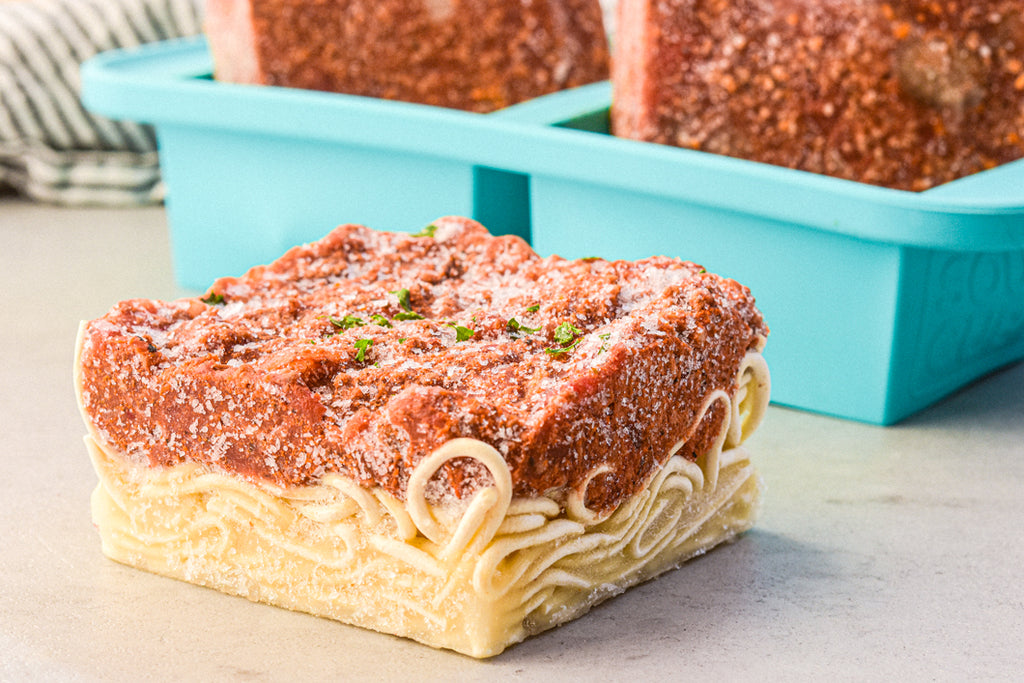




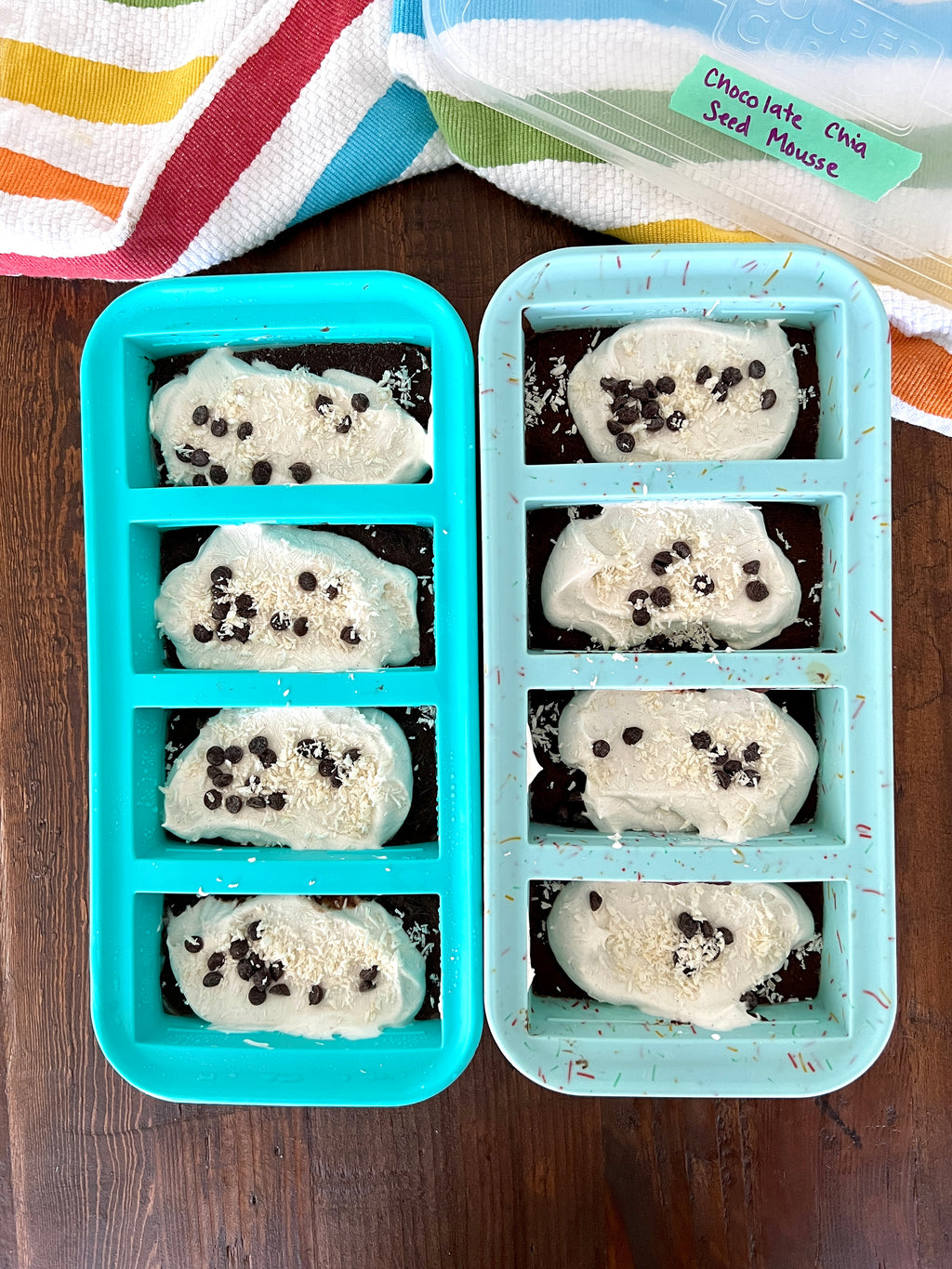
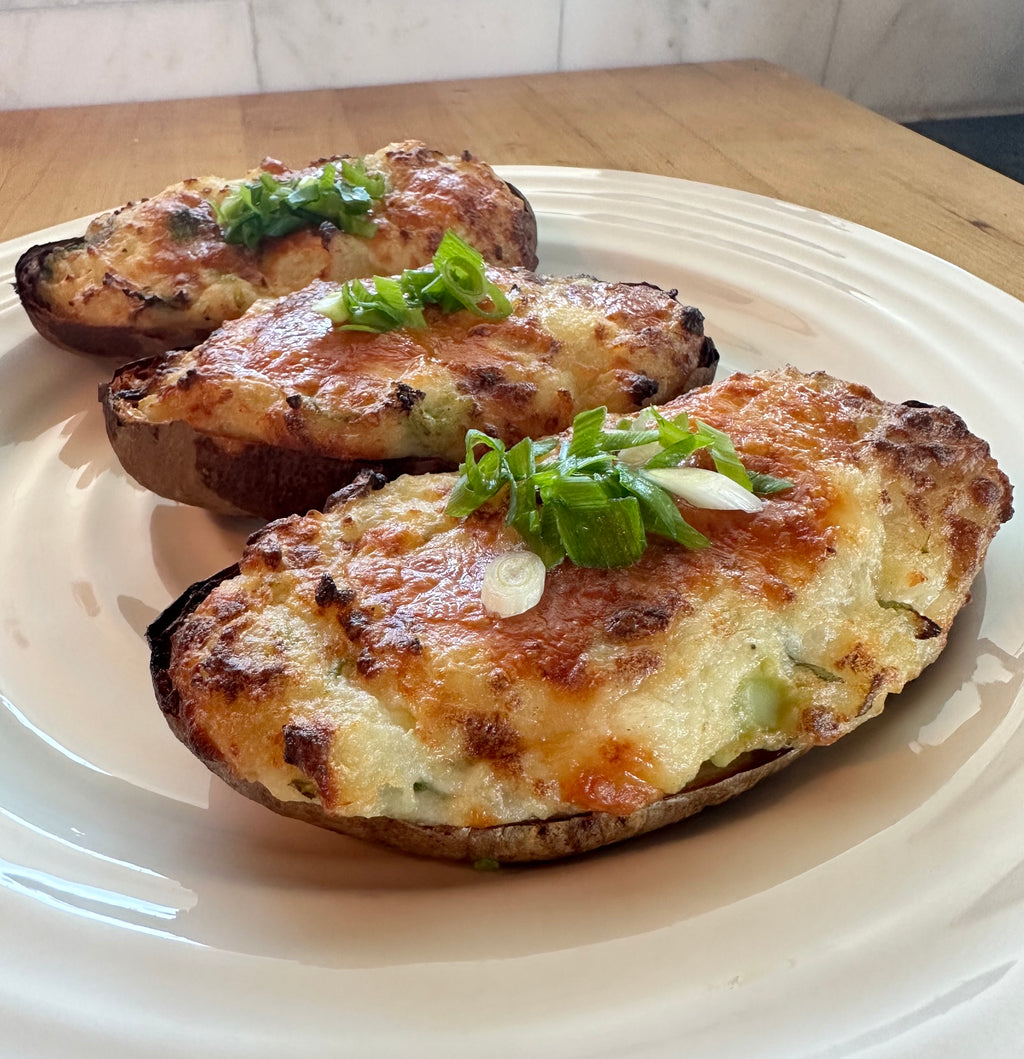
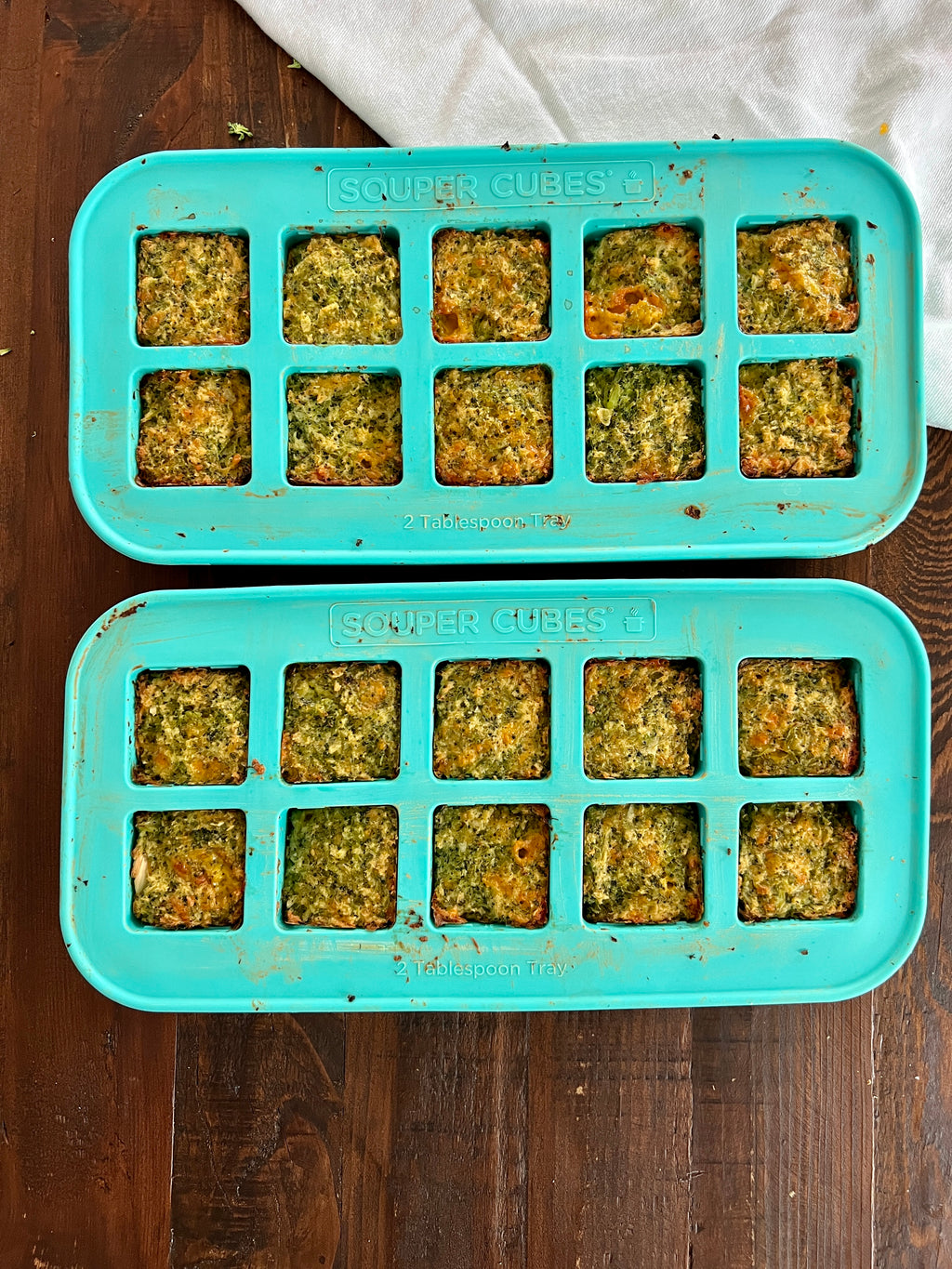
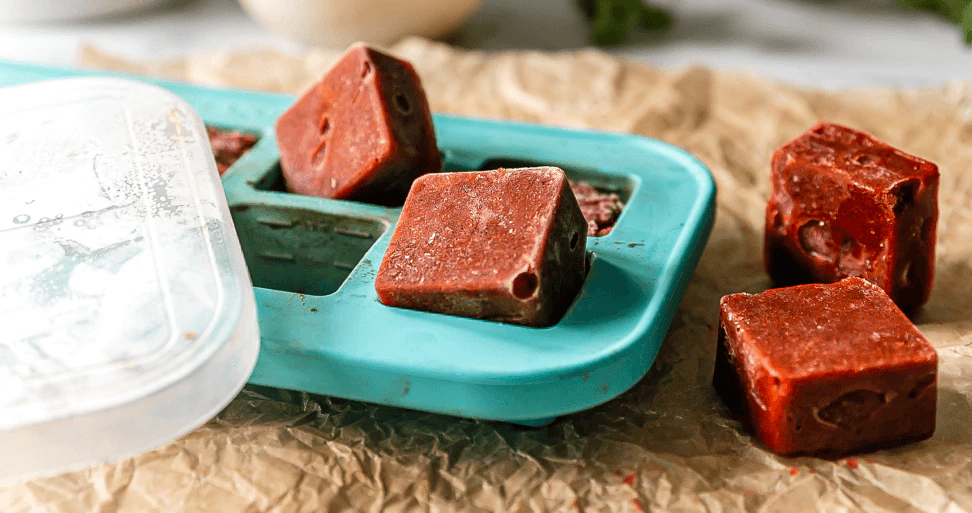

We would love to hear your ideas or better yet, post a photo of your cubes organized in our Freezer Meals & Recipes Facebook Group!